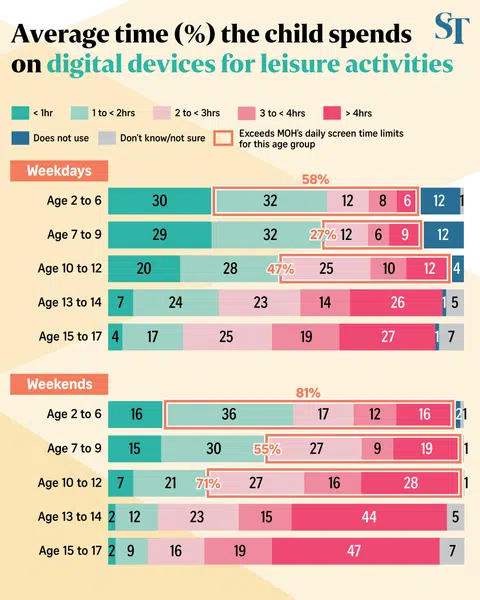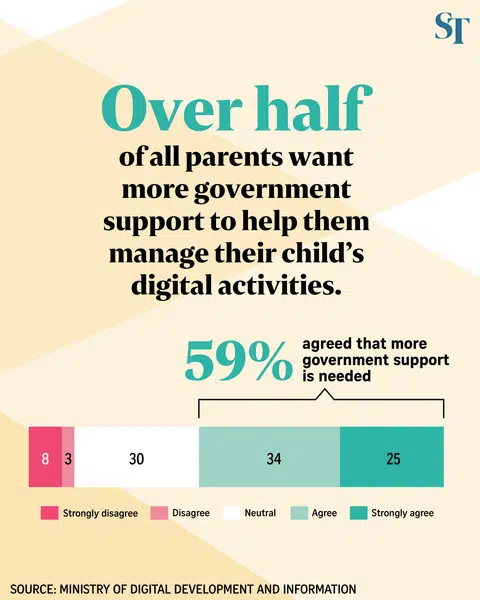More than half of preschoolers here exceed recommended screen time: Survey
More than half of children aged between two and six here spend more than an hour daily on digital devices, exceeding the recommended one-hour limit on screen time set by the Ministry of Health.
This figure balloons to 81 per cent on weekends, according to the findings of an inaugural Ministry of Digital Development and Information (MDDI) survey released on Sept 12.
The Digital Parenting Survey, conducted in February, involved 1,986 parents in Singapore with children aged between two and 17.
Parents were asked how much time their children spent daily on digital devices - including smartphones, tablets, computers and television - for leisure, and about their concerns and what sort of help they need.
The study aims to understand how parents are managing the digital activities of their children, said MDDI in its statement, adding that the results will help the Government better support parents in this endeavour.
For children aged between seven and nine, 27 per cent spend more than the recommended two hours on devices on weekdays.
This figure doubles to 55 per cent on weekends.
Nearly half of those aged between 10 and 12 spend more than the recommended two hours on devices on weekdays, and the number goes up to 71 per cent on weekends.
The Ministry of Health provided the stricter screen use guidelines in January as part of a national health strategy to encourage children and adolescents to adopt healthier lifestyles.
The ministry also advised parents not to use screens to occupy or distract children, and not to use screens during mealtimes.
The authorities have not given recommendations for screen time related to schoolwork. The MDDI survey did not include school-related screen time.
While there are no official guidelines for children aged between 13 and 17, the survey found that around a quarter of them spend more than four hours daily on digital devices during weekdays.
This number rises to nearly half on weekends.
Parents also reported that their children use devices mostly to game and stream content. Among their top concerns are exposure to inappropriate content, interaction with strangers online, cyber bullying, screen addiction and exposure to misinformation or fake news.
Parenting has always been challenging, and has been made more complex in the digital age, said Minister for Digital Development and Information Josephine Teo.

"Returning to a play-based childhood will take time, and begins with reshaping norms in children's digital habits," she said.
More than half of the respondents said they wanted more support from the Government in managing their children's digital activities, with the top choices being stronger legislation to protect children online, and digital resources and guides.
"The Government acknowledges these parental concerns and remains committed to strengthening legislation to better protect our children from online harms," said MDDI.
The ministry cited the introduction of the Code of Practice for Online Safety for social media services and app distribution services in 2023 and 2025, respectively, as examples of how social media services and app stores have been directed to minimise exposure of harmful content to users, especially children.
The Code of Practice for Online Safety for Social Media Services requires major social media platforms, including Facebook and TikTok, to provide age-appropriate safety features, parental controls and mechanisms for users to report harmful content.
Their measures are assessed annually for effectiveness.
The Code of Practice for Online Safety for App Distribution Services requires app stores to screen and prevent users aged below 18 from downloading apps meant for adults, such as dating apps or those with sexual content.
App stores have till March 2026 to roll out the measures.
A new Online Safety Commission is also expected to be established by the first half of 2026, which will help to hold perpetrators accountable and allow victims to get timely help if they encounter online harms.
Apart from such regulations, the ministry said it will continue to support parents by making resources more useful and accessible for them, and improving outreach through local community touchpoints.

"Through collaboration with community partners, we will develop in-person programmes such as workshops to equip parents with conversation starters to engage their children on risky online behaviours, and how to stay safe online," said MDDI.
"The workshop will also share ideas on offline activities to encourage family bonding."
The ministry added that it will also work with partners, such as parent influencers, to amplify and share content through social media. Collaborations with grassroots, industry and corporate partners will also be done to encourage ground-up initiatives.
Said Mrs Teo: "By working hand in hand with community partners, we can strengthen one another's efforts, reassuring parents that they are not alone and that support will always be available."
Sarah Koh for The Straits Times